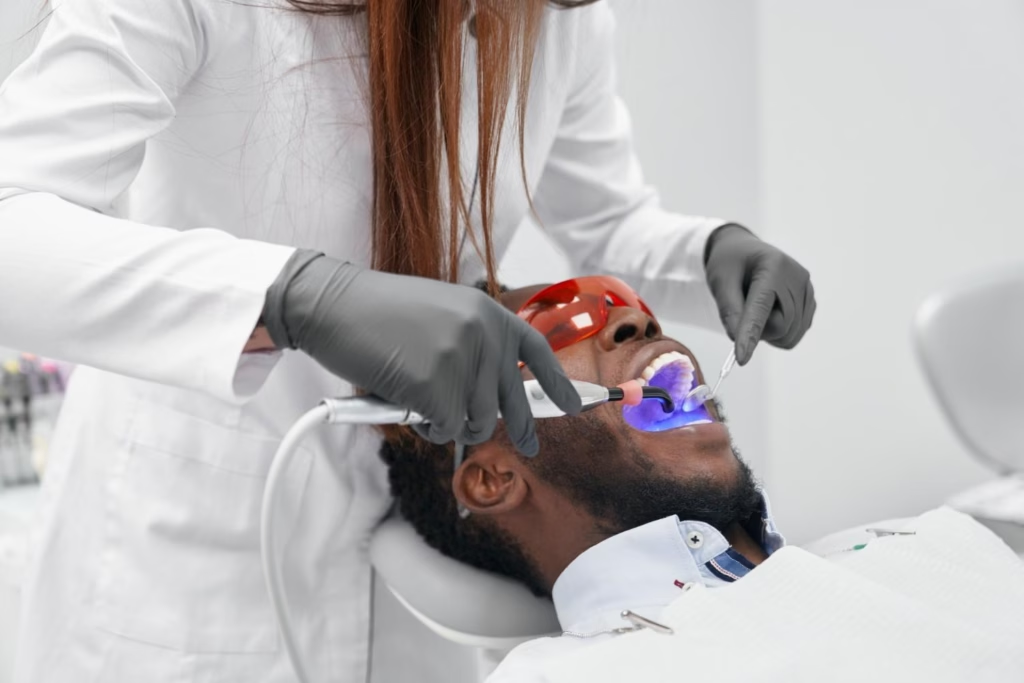
Dental health is one of the most important yet overlooked aspects of overall health in preventative medicine. It doesn’t just impact your teeth and gums, but can influence everything from your heart to your immune system, creating a ripple effect on your well-being. Maintaining good dental care isn’t merely about avoiding plaque, it’s essential for preserving your overall health and preventing costly complications down the line.
Table of Contents
- What is Dental Health
- Importance of Dental Care
- Core Dental Health Diseases
- Associated Dental Health Diseases
- How to Maintain Healthy Dental Care
- Word from Dr. Zara
- Frequently Asked Questions
What is Dental Health
Most people, when they hear about dental health, only think of having white teeth or a bright smile. But it goes far beyond that, dental health encompasses the intentional and deliberate effort to prevent issues with your gums, teeth, and any other oral structures. It’s about creating habits that safeguard against decay, infection, and disease, ensuring your mouth functions optimally as part of your body’s ecosystem.
Importance of Dental Care
Dental care is crucial for human well-being, stretching from social interactions to physical health benefits. It enhances your confidence in daily life, supports nutritional intake by allowing proper chewing, and acts as a frontline defense against systemic illnesses. That’s why it’s vital to maintain an effective dental care routine for long-term health gains. Here are core important reasons for maintaining effective dental care;
1. Avoiding Associated Diseases
By prioritizing dental care, you can sidestep a host of linked health issues, such as the link between dental health and diabetes or the relationship between mouth health and heart health. Regular habits reduce inflammation and bacterial spread from the mouth to other body systems. This proactive approach not only saves you from pain but also lowers the risk of chronic conditions escalating.
2. Improved Self-Esteem
Bad breath, rotten teeth, or visible plaque can erode your confidence, making social situations awkward. Consistent oral hygiene boosts your self-esteem by ensuring a fresh, healthy smile that lets you engage freely. Ultimately, how dental care improves life quality shines through in these everyday moments of poise and assurance.
3. Keeping Teeth Strong and Healthy Long-Term
Daily brushing and flossing fortify enamel and prevent erosion, ensuring your teeth remain robust into old age. The importance of brushing teeth daily and why flossing matters cannot be overstated, they remove debris that could lead to weakening. This foundation supports dental care for seniors benefits, allowing older adults to enjoy meals and maintain independence.
4. Avoid Dental Health Complications
Neglecting routines can lead to severe issues like abscesses or tooth loss, highlighting the consequences of neglecting dental hygiene and effects of poor dental hygiene. Preventive measures catch problems early, avoiding emergency interventions. In essence, understanding tooth decay and prevention is key to dodging these painful and expensive pitfalls.
5. Affordable Prevention
Investing in routine checkups and basic tools is far cheaper than treating advanced problems, underscoring the cost of ignoring dental health and importance of preventive dental care. Regular visits can spot issues before they balloon into major expenses. This makes dental care a smart, budget-friendly strategy for lifelong health.
Core Dental Health Diseases
Your mouth is a gateway to health, and ignoring it can lead to specific oral diseases that snowball if unchecked. Let’s break down the main ones.
1. Gum Disease
Gum disease, or periodontitis, starts with inflammation from plaque buildup and can lead to gum recession or tooth loss if untreated. The role of gum health in overall health is massive, as it connects to systemic inflammation. Regular care, like plaque removal, is your best defense against this silent threat.
2. Tooth Decay
Tooth decay erodes enamel due to acids from bacteria and sugars, causing cavities and pain. How diet affects oral health plays a big role here, sugary foods accelerate the process. Prevention through brushing and fluoride keeps teeth intact and functional.
3. Mouth and Tongue Issues
Conditions like oral thrush or tongue ulcers often stem from poor hygiene or imbalances. Signs you need a dental checkup include persistent sores or discoloration. Addressing these early maintains comfort and prevents spread to other areas.
Associated Dental Health Diseases
Beyond the mouth, poor dental health can trigger or worsen body-wide conditions. Here’s how they connect.
Endocarditis
This heart valve infection can arise from oral bacteria entering the bloodstream during procedures or from untreated gum issues. How dental care prevents disease is evident here, clean mouths reduce bacterial load. Preventive antibiotics for at-risk patients highlight the stakes.
Cardiovascular Diseases
The relationship between mouth health and heart health involves inflammation from gum disease contributing to artery plaque. Studies show links to heart attacks and strokes. Thus, why dental care is important extends to protecting your ticker through simple habits.
Pregnancy-Related Issues
Importance of oral health in pregnancy is critical, as gum disease can lead to preterm birth or low birth weight. Hormonal changes heighten risks, making checkups essential. Good hygiene supports both mom and baby’s health during this vulnerable time.
Diabetes
The link between dental health and diabetes is bidirectional—high blood sugar worsens gum disease, and vice versa. Managing oral care helps control glucose levels. For diabetics, routine dental visits are a must for overall stability.
HIV/AIDS
HIV weakens immunity, making oral infections like thrush more common and severe. Dental care supports symptom management and early detection of progression. Tailored routines can improve quality of life amid treatment.
How to Maintain Healthy Dental Care
Maintaining healthy dental care is very important and surprisingly straightforward, even for busy lifestyles. It builds resilience against decay and disease while boosting overall vitality. Start with these key practices.
- Brushing your teeth twice a day or after every meal: Use fluoride toothpaste to scrub away plaque and bacteria, emphasizing the importance of cleaning teeth regularly and role of fluoride in dental health.
- Flossing every day: This removes food particles between teeth that brushes miss, underscoring why flossing matters and preventing gum issues.
- Using mouthwash: An antimicrobial rinse kills lingering germs, enhancing benefits of oral hygiene.
- Avoiding sugars: Limit sugary snacks to curb acid production, as how diet affects oral health directly influences decay risk.
- Quitting smoking: How smoking affects dental health includes staining, gum disease, and cancer risks, kicking the habit transforms your oral environment.
- Managing associated health conditions: Control stress or chronic illnesses, since how stress affects oral health can lead to grinding or dry mouth.
For dental care routines for busy people, quick tools like electric brushes or interdental cleaners save time without skimping on results. And don’t forget dental care after surgery or treatment, gentle care aids healing.
Word from Dr. Zara
Dental health is one of the core pillars of preventative medicine. It is always important that you keep a healthy dental routine for your overall health. You can always visit your medical doctor or your dentist for tailored advice, and you can also reach me at drzaramulla@gmail.com for any health-associated query.
Frequently Asked Questions
- Why is dental care important?
A: Dental care prevents tooth decay, gum disease, and linked systemic issues like heart problems, while boosting confidence and quality of life. - What are the benefits of oral hygiene?
A: Oral hygiene reduces bad breath, strengthens teeth, lowers disease risk, and saves money on treatments by catching issues early. - How do regular dental checkups help?
A: They detect problems like cavities or cancer early, clean hard-to-reach areas, and provide personalized tips for better habits. - What happens if you skip dentist visits?
A: Skipping leads to buildup of plaque, potential infections, tooth loss, and higher chances of serious health complications over time. - Importance of dental care for kids?
A: Childhood dental care importance lies in establishing lifelong habits, preventing early decay, and supporting proper jaw development. - How dental care improves life quality?
A: It enables pain-free eating, clear speech, confident smiles, and reduces risks of chronic diseases for a more vibrant life. - What Dental care tips for healthy teeth?
A: Brush twice daily, floss, use fluoride, eat balanced diets, avoid tobacco, and schedule bi-annual checkups for optimal results.
